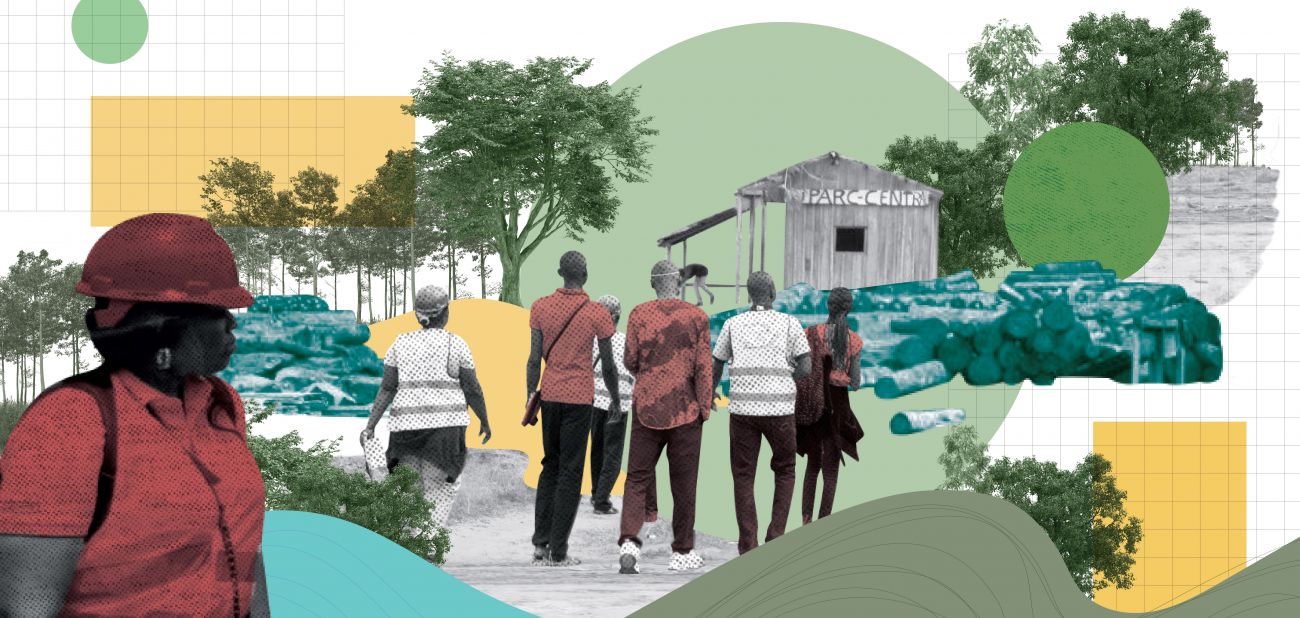

Tropical forests provide vital goods and services to people, both near and far, and are essential to humanity’s defining challenges of addressing poverty, climate change and biodiversity loss. But for decades weak governance and powerful vested interests have put immense pressure on these forests and the communities that depend on them.
In recent years, major policy shifts have been creating opportunities to reduce these pressures. Those have allowed civil society networks to play a greater role in forest governance. For example, when the government of the Central African Republic started negotiations with the European Union to develop a timber trade agreement called a FLEGT Voluntary Partnership Agreement (VPA), in 2009, civil society organizations in the country knew they needed to engage with this process.
A group of these organizations formed a network called the Platform for Sustainable Management of Natural Resources and the Environment (Plateforme Gestion Durable des Ressources Naturelles et de l’Environnement or GDRNE). The goal was to build capacity to engage in the VPA process and to advocate for good governance and respect for communities’ rights. Despite the political situation in Central Africa and the low capacity of the network to mobilize funds, the platform was heavily involved in the VPA negotiations. It contributed to the development of the VPA’s definition of legal timber, as well as to the legal reform processes and the drafting of legal texts.
“Previously, civil society had little involvement in decision making about the forest sector in the Central African Republic and had limited capacity to engage,” says Horline Njike, secretary general at FLAG. “Now, thanks to the efforts of GDRNE, there is substantive engagement between civil society and the government on issues relating to forests, land and natural resources. There is greater transparency and civil society groups have a recognized role as independent observers of the forest sector.”
In the past two decades, civil society networks like the one in the Central African Republic have formed across the tropics to address issues related to forest governance. Often they work to complement, replace or fill gaps in government actions. Such coalition building has emerged as a promising approach to expanding democratic opportunities and ensuring success of development and policy efforts. Civil society organizations (CSOs), public and private donors and development agencies are turning to these networks to deliver aid effectiveness.
These networks have sometimes been created around new spaces for dialogue with other stakeholders, as governments and others have increasingly recognized the role of civil society in forest governance. Along with FLEGT, other initiatives have also opened up opportunities for stakeholder engagement in forest policy processes, including REDD+, national community forestry programs, and deforestation-free value chains.
The participation of civil society networks in these dialogues has had substantial impacts, such as a better recognition of communities’ rights, and increased transparency, accountability and practices in the forest sector. Integration of local realities and perspectives at the decision-making level has also improved. With the steady engagement of these networks over the past 15 years or so and the passing and implementation of new agreements and laws, it is now time to reflect on the effectiveness of such networks.
“The rise in civil society actions in the forest governance sector in recent years has been rapid,” says Robin aus der Beek, coordinator of the Voices for the Mekong Forests project. ”Civil society groups are now keen to take stock of their experiences and explore the effectiveness of the networks they have formed. Governments, policymakers and practitioners are also interested in this, as are donors, having invested significantly to promote the emergence and development of civil society networks. Interestingly, there is a diverse interpretation on how effectiveness is perceived among different stakeholders.”
This special report summarizes the findings of a study on this topic by the University of Wolverhampton’s Centre for International Development and Training (CIDT), the Field Legality Advisory Group (FLAG) and RECOFTC. It provides an overview of why networks form and how their members benefit, how networks and external stakeholders define effectiveness, and what factors influence it. The report ends by analyzing the findings and introduces a guide that networks can use to define and assess effectiveness.
To explore this topic, CIDT, FLAG and RECOFTC surveyed civil society networks they have been working with on forest governance issues in Central Africa, West Africa and the Mekong region. The study looked at 14 networks in 12 countries. These networks are involved in independent forest monitoring, FLEGT VPAs, REDD+, land tenure issues, community forestry and forest policy processes.
The researchers interviewed 123 network leaders and members, and representatives of donor agencies, governments and international non-governmental organizations (NGOs). In addition, 83 network members and leaders in 10 of the 12 countries completed an online questionnaire. The study team made a commitment with all interviewees to maintain full confidentiality of their responses. Therefore, while this report includes some quotations from the interviews, it does not attribute them to individuals.




